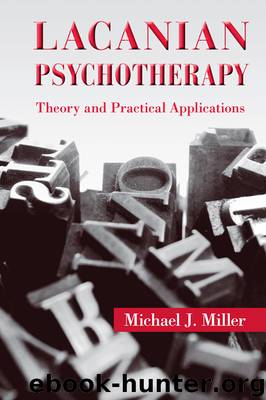Lacanian Psychotherapy by Miller Michael J.;

Author:Miller, Michael J.;
Language: eng
Format: epub
Publisher: Taylor and Francis
Things Left Unsaid
Much in this chapter lends itself to critique. For example, a basic element of the theory employed in this case—that we lose our imaginary phalluses as children and that one developmental task, with which therapy can assist, is to gain the symbolic phallus by way of articulating the original loss—is never confirmed by Steve in an unambiguous way. I never heard Steve say that he was not allowed to have a penis or genital pleasure; I never heard him weep for the loss of that part of himself.
Rather, I have perhaps provided here a somewhat extreme example of hearing the patient in ways other than those in which he intends to be heard. In the midst of so much interpretive listening, one is right to wonder whether the intentions of the patient have not suffered short shrift, and whether my constant attention to alternative meanings and implications in Steve’s speech was not a bit excessive, especially given the fact that Steve never confirmed the theoretical tenets behind my intentional mishearings with any unassailable clarity. I wonder this myself. Instead, I have used one area of Lacanian theory (which remains to be confirmed or disconfirmed) to confirm another. That is, I used a Lacanianinspired reading of Steve’s speech to the letter in order to illustrate, and perhaps prop up, the Lacanian theory of phallic loss and symbolization. Whether this is a kind of academic cheating is open to debate, but it is noteworthy that one aspect of Lacanian theory seems to help justify the applicability of another, without much direct evidence from the patient at all.
In defense of the theory, however, we can see several ways in which Steve’s castration was made manifest in this chapter, and evidence was in fact in much greater supply in the therapy, but confidentiality imposes limits upon my ability to disclose it. That aside, there is also the fact that this was a relatively short therapy that operated upon an artificially imposed timeline, and it is possible that given the time, Steve may have come to more clearly articulate that which I hypothesized in this chapter. Of course, this cannot be known.
At the same time, the very weakness that I have just discussed may provide us with an illustration of an extremely elusive (if theoretically wobbly) phenomenon: the engagement in psychotherapy of the Other, the Lacanian unconscious. This chapter has shown the therapist in a rather consistent role as a kind of creative mishearer, a listener to that which the ego did not mean to say, and thereby as an interlocutor to a kind of absent speaker (i.e., the Other). While it of course cannot be proven that I was listening and responding to the true meanings and intentions of Steve’s unconscious (because the unconscious is a construct that precludes real proof, since it cannot consciously affirm our hypotheses), it is interesting to note the way in which Steve’s speech seemed to sustain my ability to misread it across more than a year.
Download
This site does not store any files on its server. We only index and link to content provided by other sites. Please contact the content providers to delete copyright contents if any and email us, we'll remove relevant links or contents immediately.
Rewire Your Anxious Brain by Catherine M. Pittman(17589)
Talking to Strangers by Malcolm Gladwell(11876)
The Art of Thinking Clearly by Rolf Dobelli(8841)
Mindhunter: Inside the FBI's Elite Serial Crime Unit by John E. Douglas & Mark Olshaker(7834)
Becoming Supernatural by Dr. Joe Dispenza(7105)
Change Your Questions, Change Your Life by Marilee Adams(6641)
Nudge - Improving Decisions about Health, Wealth, and Happiness by Thaler Sunstein(6633)
The Road Less Traveled by M. Scott Peck(6633)
The Lost Art of Listening by Michael P. Nichols(6472)
Enlightenment Now: The Case for Reason, Science, Humanism, and Progress by Steven Pinker(6405)
Win Bigly by Scott Adams(6311)
Mastermind: How to Think Like Sherlock Holmes by Maria Konnikova(6235)
The Way of Zen by Alan W. Watts(5799)
Daring Greatly by Brene Brown(5640)
Grit by Angela Duckworth(4736)
Big Magic: Creative Living Beyond Fear by Elizabeth Gilbert(4723)
Men In Love by Nancy Friday(4322)
Flow by Mihaly Csikszentmihalyi(4052)
The Four Tendencies by Gretchen Rubin(4024)
